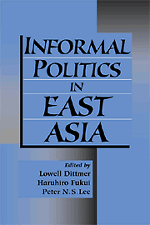Book contents
- Frontmatter
- Contents
- Preface
- Contributors
- INTRODUCTION: On the Significance of Informal Politics
- PART I Informal Politics in Industrialized Asian Democracies
- PART II Dictatorship with Chinese Characteristics: Macroperspectives
- PART III Case Studies in Chinese Corporatism
- PART IV Asian Authoritarianism on the Chinese Periphery
- CONCLUSION: East Asian Informal Politics in Comparative Perspective
- Glossary
- Index
CONCLUSION: East Asian Informal Politics in Comparative Perspective
Published online by Cambridge University Press: 20 May 2010
- Frontmatter
- Contents
- Preface
- Contributors
- INTRODUCTION: On the Significance of Informal Politics
- PART I Informal Politics in Industrialized Asian Democracies
- PART II Dictatorship with Chinese Characteristics: Macroperspectives
- PART III Case Studies in Chinese Corporatism
- PART IV Asian Authoritarianism on the Chinese Periphery
- CONCLUSION: East Asian Informal Politics in Comparative Perspective
- Glossary
- Index
Summary
As our survey clearly shows, informal politics remains a prominent, pervasive feature of political life throughout contemporary East Asia. We have contended, however, that whereas “bringing the state back in” has made a major contribution toward conceptualizing the political economy of rapid growth in the region, it does not really take us very far toward understanding how politics actually gets done – perhaps anywhere, but certainly not in East Asia. The “state,” as in the “state–society” paradigm, is a concept that is far too homogeneous and monolithic, too static and rigid to capture the infinite variety of cross-cutting relationships that we find to be characteristic of informal politics. If the “state,” conventionally defined, is too narrowly gauged, “society” is too broad and indiscriminate. The concept of “political culture” encompasses our interests, as is fruitfully realized within this volume by C. F. Yang, who shows how the normative dimension of informal politics in particular is inseparable from its cultural-linguistic dimension; or by Douglas Pike's evocative account of the impact of “lingering traditionalism” on Vietnamese politics. Yet the concerns of “political culture” also go well beyond informal politics – including, for example, theories of transhistorical versus psychocultural origin, or the relations between public symbolism and psychological motives, and other unresolved methodological controversies that need not detain us here. The analysis of “civil society,” which was greatly stimulated by the collapse of communist regimes in Eastern Europe, seems initially more promising as a conceptual bridge to span the hiatus beween state and society.
- Type
- Chapter
- Information
- Informal Politics in East Asia , pp. 290 - 308Publisher: Cambridge University PressPrint publication year: 2000
- 9
- Cited by



